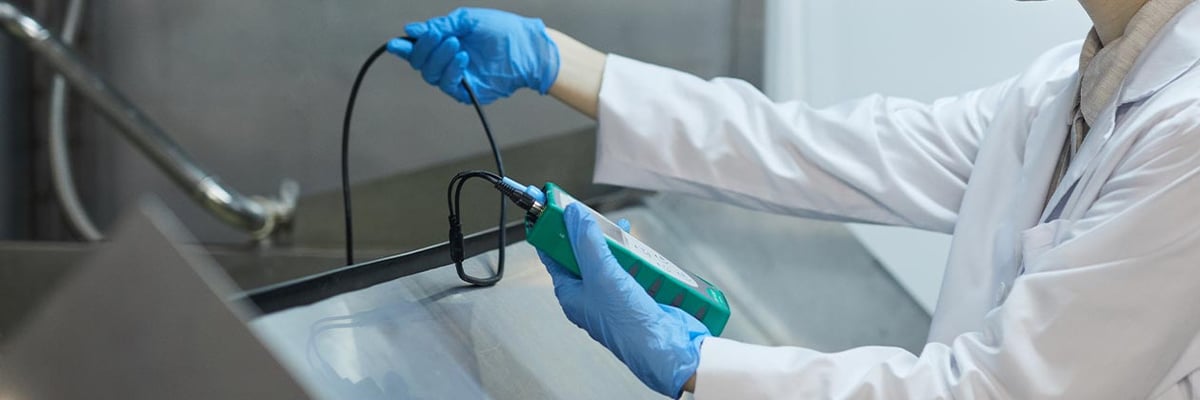Author: Ben Hartman | November 1, 2024 | 4 Min Read
How Will AI Change Food Safety?

Few technological advancements in the modern era have been as talked about or potentially game-changing as artificial intelligence. The impact of AI tools is already felt in all types of industries - including the food industry.
This week, Rootwurks held a webinar featuring Joel Chappelle, Attorney and Consultant at Food Industry Counsel LLC, and Chase Eastman, Rootwurks Founder and CEO, to discuss how AI tools will impact food safety in the years to come, the benefits of AI in food safety, and what food industry professionals need to know about these emerging technologies.
Here are some key takeaways from the webinar.
1. AI tools should make compliance easier
Meeting the compliance demands of the food industry requires not only understanding a long list of food safety regulations but also keeping track of which tasks you have performed - and which you haven’t tackled yet.
With AI tools, meeting food safety regulations should be easier, according to Chappelle.
“Having programs that can track your compliance paperwork and what you’re doing on a day-to-day basis to make sure all the proper data is being entered and daily forms are completed, AI will be able to evaluate that on an hourly basis.”
2. AI will improve food traceability for companies
Food traceability practices are essential for ensuring food safety, but collecting and managing the required data can be a tall order for any industry professional.
“AI is efficient at enhancing traceability by being able to quickly take a large and complex data set and distill it down into patterns,” Chappelle said, adding “AI will be able to enhance your traceability by tracking and analyzing data all the way back to farm and table.”
3. AI has the potential to make recalls less painful
When a food contamination incident arises time is of the essence and the cards can be stacked against you. With the proper use of AI tools, companies can mitigate the damage by locating the sources of contamination quicker than they could otherwise.
Chappelle said the ability of AI tools to quickly analyze massive sets of data can speed up the process of tracing the source of a contamination incident, saving time and money.
“It’s going to be smaller, it's going to cost you less because you're going to have that extra data and be more timely which will help from a regulatory and customer standpoint. It's hard to overstate how helpful this can be.”
4. AI will bolster food safety training
With AI tools, companies can supplement their team's strengths and weaknesses and create a unique training curriculum specifically suited to their needs - and the makeup of their team.
“There are so many different ways you could leverage AI to forge interconnection between your team members and supplement that skill set,” Eastman said.
5. The human element is essential for AI
Eastman spoke about how AI tools can be an “immense” help with administrative roles, “and can serve as an AI administrative assistant of sorts” to help companies handle all times of busy work that takes time out of the day.
But these tools are only as strong as the humans working with them. It is essential that companies collect the right data and put checks and balances in place for AI tools.
“You still need to trust, but verify,” Eastman said, adding that “the better your data the better the AI.”
Eastman said that how companies benefit from the use of AI depends greatly on their commitment to food safety culture and whether or not they have the data set for AI tools to utilize.
Finally - AI may create MORE jobs
Much of the discussion about AI in the workplace takes a tone of fear and concern - mainly about potential job loss.
But both Chappelle and Eastman pointed out that like any developing, groundbreaking technology, AI could mean the creation of more jobs, not less.
“I think of it [AI} as basically augmentation. AI is designed to complement human workers,” Chappelle said.
“I think AI is actually more likely to create more jobs than replace them as it becomes more integrated into the food industry.”
Chappelle said increased adoption of AI tools means new job roles to utilize these tools. These range from data maintenance to analysis, AI-driven product development, supply chain management, and much more.
Eastman issued a similar analysis, saying “I don't think it's something that’s going to necessarily take jobs away, I think there are jobs [with AI] that we’ve never thought of even.”
He used as an example the writing of prompts for tools like ChatGPT and how knowing the best ways to write prompts can provide a qualitative edge for companies and could be a valued role moving forward in the food industry.
Artificial intelligence tools will have a major impact on food safety and the food industry as a whole in the years to come.
To hear more about what to expect from the future of AI in food safety, watch the latest Rootwurks webinar “How AI Will Change Food Safety” on-demand here.
Contributors

Ben Hartman
From HACCP certification to the basics of hygiene, our on-demand courseware has you covered.


.jpg?width=1200&height=628&name=Linkedin2B%20(1).jpg)





